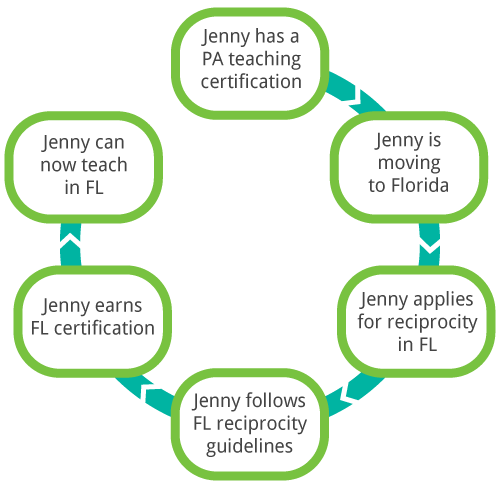Teacher Certification Reciprocity & How It Works


Navigating the ins and outs of teacher certification reciprocity can be overwhelming and include countless Google searches.
Nevertheless, it is a big part of the certification process, as teachers and prospective educators move from state to state, or even come from another country. Luckily, this article has all the information you’ll need to get on the right track towards understanding teacher certification reciprocity.
Throughout this article you will find the answers to questions such as these:
- What Is Teacher Certification Reciprocity?
- How Does Certification Reciprocity Work?
- What Is the Interstate Contract for Teacher Certification?
- How Do I Apply for Teacher Certification Reciprocity in Another State?
- How Can a National Teacher Certification Help Me?
- What Is a Regional Teacher Certification?
- Who Should Apply for Teacher Certification Reciprocity?
- Can Non-U.S. Citizens Apply for Teacher Certification Reciprocity?
Read on to find out what teacher certification reciprocity is and how it can benefit you.
What Is Teacher Certification Reciprocity?
Reciprocity is an exchange between two parties for mutual benefit. Sounds like a fairly simple concept, right? Well, when you combine the term with teacher certification it suddenly becomes slightly more complicated. In its simplest form, teacher certification reciprocity serves as a way to allow teachers with a teaching certification in one state to easily gain a teaching certification in a different state. Although seeking out teacher certification reciprocity is not always an ‘easy’ thing to do, it is possible and is there to help you continue your career as a teacher in a new state without having to start over.
How Does Certification Reciprocity Work?
In a perfect world, a teacher with a certification in one state would be able to teach in all U.S. states; unfortunately, that’s not the case. Because requirements for teaching certifications can vary widely from state to state, more steps often need to be taken before you can teach in a state that you don’t have a certification for. Those extra steps make up teacher certification reciprocity.
In order to understand just how teacher certification reciprocity works, we’ll begin by breaking it down into an example using a teacher named Jenny. Jenny is a certified teacher in the state of Pennsylvania. Her husband just got a promotion and is being told that he’ll need to move to Florida. Jenny now needs to begin the daunting task of finding out how she can teach in the state of Florida with a teacher certification from Pennsylvania, and that’s where teacher certification reciprocity comes into play.
With her Pennsylvania issued teaching certificate, Jenny will want to contact the Florida Department of Education to find out if Florida grants reciprocity from Pennsylvania. By using the department’s online resources or speaking with a representative, Jenny finds out that she will be able to transfer her teacher certification. Now, Jenny will need to begin the process for a transfer by following the guidelines laid out by the Florida Department of Education. Once the process is completed and she has earned approval, Jenny will have a Florida teacher’s certificate and be able to begin teaching.

When you use teacher certification reciprocity to obtain a teacher certification in a new state, you are not forfeiting your teacher certification in the original state. Rather, you will now have two teacher certifications for two states. If there is a chance that you will move back to the state where you first earned your teacher certification, you should make sure you keep it current. Allowing your certification to expire in one state will require you to apply for reciprocity if you ever move back to that state. Because certification reciprocity is not a two-way system, you may not be able to easily transfer your certification back to the original state.
Learn more about how reciprocity is not a two-way agreement in the following two sections.
Interstate Contract for Teacher Certification
The interstate contract, or interstate agreement, was created by the National Association of State Directors of Teacher Education and Certification, more commonly known as NASDTEC. They uphold the standards for educators and represent the individual state boards that prepare and license teachers.
The interstate agreement serves as a guideline for teacher certification reciprocity between states. Knowing that teachers do not always teach in the same state forever, NASDTEC created the interstate agreement as a way to meet the needs of mobile teachers. An alternate agenda of the interstate agreement was to respond to teacher shortages. By allowing for teacher certification transfers between states, the interstate agreement encourages teacher mobility, which has the potential to increase the flow of teachers moving to high-need areas, such as urban or rural districts.
What it is:
- It is a collection of over 50 agreements.
- Agreements come from individual states, the District of Columbia, Guam, Puerto Rico, and some Canadian provinces.
- It is a statement made by individual participating states outlining which other state educator certification will be accepted.
What it is not:
- It is not a two-way agreement between states.
- Oregon may accept certifications from Maine, but that does not imply Maine will accept certifications from Oregon.
- It is not always full reciprocity, additional requirements may need to be met in order to obtain a certification.
The interstate contract goes a step further in defining acceptable certifications by specifying what types of educator certificates and what styles of certifications will be accepted. Educator certificates are often broken into categories such as these: teachers, administrators, service personnel, or career/technical. On the other hand, styles of certifications usually indicate: titles, fields, etc. In accordance with the interstate agreement, a participating state will dictate how these certifications will transfer into their state.
How Do I Apply for Teacher Reciprocity in Another State?
Although we went over a brief example of what it would look like for you to apply for certification reciprocity in the section titled ‘How Does Certification Reciprocity Work?,’ it’s important to go into more detail. First and foremost, as mentioned previously, every state agreement is different. What that means is that the agreement between Florida and California may be different from the agreement that Florida and Georgia have made.
Let’s say you knew a coworker who easily transferred their certification from Virginia to California. Now that you’re looking to move from Virginia to Colorado, you’re hoping for a similar experience. What you’ll need to remember is that will not necessarily be the case. Because every state has a different agreement, the process of transferring your teaching certification will look different from state to state. Some states accept certification from another state without any extra steps, while others require additional testing.
What if you want to teach while you complete the steps that your new state requires? That’s where there is good news. Many states offer temporary teaching certificates so that you can teach while you earn your certification.
Always check with the state teacher licensing board for the state that you intend to move to in order to make sure that your information on the interstate agreement is up-to-date and accurate. The licensing board will be able to provide you with the details that you need in order to successfully transfer your certification and continue your career as a teacher.

National Teacher Certification
Many teachers earn a National Board Certification offered by the National Board for Professional Teaching Standards (NBPTS) in addition to their state issued teaching certification. The national certification seeks to unify teaching standards across the country and raise the overall quality of education for students. Earning a board-certification through the NBPTS is a voluntary process that shows your dedication to your career as an educator and to the students within your classroom.
By earning a national teacher certification, in addition to your state certification, you are also increasing your chances of having an easy certification transfer process.
Most states recognize the National Board Certification as a quality achievement and grant automatic certification to out-of-state teachers who have earned this credential. This can be a huge benefit to those teachers who move frequently.
Automatic certification will not always be an equal exchange for the current certification you hold, however. While a state may grant you a certification, it may not be as advanced as the certification you held in your previous state. In some cases, a state may only grant you a temporary certification while you meet additional standards that they have in place.
Regional Teacher Certification
Regional teacher certification programs can be helpful for teachers who want to move to a state within their region. By contacting your regional certification program, you may be able to easily obtain reciprocity in a state within your region. Although these programs can be extremely helpful, not every region has one.
There are three notable regional organizations that support reciprocity between the states:
- Northeast Common Market
- Midwest Regional Exchange
- Mid-Atlantic Regional Teacher Project
These organizations work with the state licensing boards within their region to encourage and promote teacher mobility through reciprocity. To find out if a regional program can benefit you, refer to the chart below:
Includes eight northeastern states:
- Connecticut
- Maine
- Massachusetts
- New Hampshire
- New York
- Pennsylvania
- Rhode Island
- Vermont
Established in 1988
Follows the framework of the interstate agreement designed by NASDTEC.
Enables teachers from a state within the region to teach for up to two years before meeting the requirements of their state.
A teacher may use this regional accreditation only once.
Includes nine midwestern states:
- Illinois
- Iowa
- Kansas
- Michigan
- Missouri
- Nebraska
- Oklahoma
- South Dakota
- Wisconsin
N/A
The structure is similar to that of the Northeast Common Market.
Those who complete a regionally accredited preparation program, or have a certification from one of the regional states, can obtain a two-year conditional certification within a different regional state.
To earn a standard certification, candidates must complete any additional requirements that are requested.
Includes five states and one district:
- Maryland
- Delaware
- Pennsylvania
- New Jersey
- Virginia
- District of Columbia
Established in 1998.
Created to survey and address teacher shortages, ensure the highest quality of teachers, and to create license reciprocity for the region.
Reciprocity concern was addressed by creating the Meritorious New Teacher Candidate designation (MNTC), a voluntary certification that goes above every regional state’s certification requirements.
Upon earning MNTC, teachers will be awarded full regional reciprocity and will be able to transfer their license between the participating states.
Who Should Apply?
You should consider applying for teacher certification reciprocity if you are a certified teacher who is looking to teach in a new state. The interstate agreement was created
specifically for the benefit of teachers who find themselves needing to move out of their current state, but still want to continue teaching.
If you do not have a teaching certificate, the reciprocity agreements will not benefit you. Those who have a temporary teaching certification, including emergency issued, will not be able to apply for reciprocity. But, there are several alternate paths you can consider.
If you are moving to a new state and are considering taking a break from teaching, be sure to keep your teacher certification up to date. Once you are ready to begin teaching again you may still be able to apply for teacher certification reciprocity, but only if your certification is current. If you let your certification expire you will need to gain a new certification and teacher certification reciprocity
will not be able to help you.
Can Non-U.S. Citizens Apply?
There are opportunities for non-U.S. citizens to apply for teacher certification reciprocity. However, there are three very important aspects of reciprocity for non-U.S. citizens that are worth noting:
- Not every state will accept or allow applications from non-U.S. citizens.
- States that do accept or allow applications from non-U.S. citizens will often require additional steps beyond those that are required for applicants who are U.S. citizens.
- While some states do allow non-U.S. citizens to apply, they also require that those applicants hold a permanent resident visa or have filed a declaration of intent to become a citizen.
Those who are interested in seeking teacher certification reciprocity as a non-U.S. citizen should check with the state’s education board to see if they are eligible for reciprocity.



